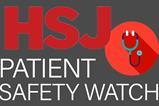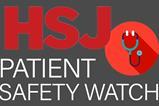HSJ is now hosting the Patient Safety Watch newsletter, written by Patient Safety Watch chief executive James Titcombe.
Good afternoon and welcome to the latest edition of the Patient Safety Watch newsletter. This week covers a three-week period due to the Easter bank holiday weekend, so with lots of news to cover, let’s get stuck in.
Government response to patient safety recommendations ‘requires improvement’
A report from the expert panel of the Commons health and social care committee has criticised the government’s lack of urgency to implement recommendations from major patient safety inquiries.
The panel examined five recommendations from independent inquiries and reviews going back to 2013, covering recommendations to improve maternity care and leadership, staff training, safety culture, and whistleblowing.
Expert panel chair Dame Jane Dacre said: “We’ve looked at recommendations made by significant inquiries, Morecambe Bay and Mid Staffs, both involving tragic loss of life. Nine or more years have passed since these recommendations were accepted by the government of the day. We are concerned about delays to take real action to implement them and rate overall progress by the government on this serious matter as requiring improvement.”
While the panel’s work has focused on five recommendations, I suspect if it had had a wider scope and covered all the recommendations of major inquiry reports over the last two decades, a similar picture – one of fragmented progress and many recommendations yet to translate into the change intended – would emerge. This implementation gap exists both nationally and locally when recommendations to learn from patient safety problems are made.
For national-level inquiries, too often the inquiry chair and panel are disbanded with their recommendations then sitting loosely in the system with no rigorous oversight or accountability for implementation. If this is to change, we need a different model for these types of inquiries, with ongoing independent oversight and scrutiny of what happens after the report is published. Publication of a report should be the start of the process, not the end!
Meanwhile, the Commons health and social care committee is also looking at NHS leadership, performance and patient safety with findings and recommendations expected in the coming months.
Ombudsman warns of ‘cover-up culture’ across NHS
In an interview with The Guardian, Parliamentary and Health Service Ombudsman Rob Behrens has warned hospitals are hiding evidence of poor care as well as focusing on their reputation ahead of being transparent and honest with grieving loved ones.
He told the newspaper his work over the past seven years had seen him “confronting the duality of an NHS resourced by brilliant people who kept it going through the covid pandemic but, at the same time, having to confront a cover-up culture, including the altering of care plans and the disappearance of crucial documents after patients have died and robust denial in the face of documentary evidence”.
Mr Behrens stepped down from his role last month.
And, shortly before he left his post, Mr Behrens wrote to health minister Maria Caulfield to highlight continued failings in eating disorders care, warning these issues were “causing avoidable harm to patients”.
I’m personally sad to see Rob’s term as PHSO come to an end. Rob joined PHSO at a difficult time for the organisation, and while there is no doubt more to do (at all levels of the NHS complaints system), Rob has been a strong advocate for patient safety. We wish him all the best for the future.
Maternity safety remains in the spotlight
This newsletter often features stories reflecting problems with maternity safety. Sadly, this edition is no exception.
ITV News Meridian covered the findings of a Care Quality Commission inspection of Horton General Hospital in Oxfordshire, which warned babies were at risk of harm, legal firm Fieldfisher has published a summary of a recent legal settlement for a boy brain-injured at birth at St Mary’s Hospital in Manchester, and a midwife whistleblower has spoken to ITV Central warning of a “crisis” in maternity care.
Meanwhile, The Guardian’s Sirin Kale has written a powerful piece on maternity safety that deserves to be widely read.
And earlier this week, an investigation by HSJ revealed maternity departments are raising thousands of safety reports every year related to delayed inductions of labour, although the consistency of reporting both “red flag” incidents and Datix entries varied widely across trusts.
Information from 50 trusts showed there had been 4,945 “red flag” incidents – where induction is delayed for two hours or more after admission – in 2022-23, as well as 1,997 Datix reports across 59 trusts. However, while one trust reported nearly 900 red flag events in the year, others – including some hospitals with known problems with delays for induction of labour – said they had none or very few.
In more positive news, as reported by the BBC, Royal United Hospitals Bath’s maternity services have retained their “outstanding” CQC rating. This shows what’s possible, but the fact only 3 per cent of England’s maternity services are currently rated “outstanding” also indicates just how much work there is to do to ensure all women, babies and families receive the quality of care they deserve.
Thousands of deaths feared because of long A&E waits
The Guardian has reported on calculations by the Royal College of Emergency Medicine which estimate almost 14,000 people died last year – the equivalent of 268 people each week – because of long waits in accident and emergency departments. The finding is based on a 2021 study published in the Emergency Medicine Journal, which found there was one excess death for every 72 patients who waited in A&E for 12 hours or more.
RCEM president Adrian Boyle said: “Excessively long waits continue to put patients at risk of serious harm. Small improvements in four-hour access standard performance are not meaningful when there are so many people staying more than 12 hours. Effort and money should go where the harm is greatest.”
Children’s mental health care a ‘ticking time bomb’
A CQC report has found children face long waits – 40 days on average – for mental health care because the service lacks staff and funding.
The report also found that people from ethnic minority communities continue to be less likely to receive the mental health care they need, despite being more likely to experience mental ill-health.
CQC director of mental health Chris Dzikiti said: “Half a million children are receiving or waiting for mental health care and are having to wait on average 40 days to access care, but often much longer – with many reporting a deterioration in their mental health while waiting and some attempting to take their own life.
“Without access to good, timely care, children with mental health needs are at increased risk of harm and in some cases suicide. This issue is a ticking time bomb, and we will face the consequences if it’s not resolved.”
Investigation launched into risk of healthcare staff fatigue
The Health Services Safety Investigations Body has announced it is investigating the effects of healthcare staff fatigue on patient safety incidents and has asked for people to come forward to share their experiences.
Saskia Fursland, senior safety investigator, said: “Our investigation is examining staff fatigue specifically from a patient safety perspective. We aim to make safety recommendations as part of this investigation that help health and care organisations to proactively manage this risk, in support of patient safety and staff wellbeing.”
Important work from HSSIB and we look forward to reading the report and recommendations.
Sharing some good stuff…
Raising awareness of hypoxic-ischaemic encephalopathy
HIE Awareness Day took place on 4 April. HIE is caused by a lack of oxygen and blood flow to the brain, affecting babies before, during or shortly after labour (it can also affect older children). To mark the day and raise awareness of HIE, Sarah Land, co-founder and manager of the brilliant charity Peeps, has written a powerful and informative article – well worth a read.
Sharing best practice and maternity improvement work at the National Maternity Safety Conference 2024
The fifth National Maternity Safety Conference hosted by the fantastic charity, Baby Lifeline, will take place on 26 September 2024 in Birmingham. The conference has become a must-attend event for anyone interested in maternity improvement. This year the event will be solutions-focused, with trusts’ senior decision-makers, frontline staff, service users, and campaigners uniting to achieve Baby Lifeline’s goal: the best possible outcome for every mother, birthing person and baby.
Baby Lifeline is always keen to showcase healthcare best practices. The charity is, once again, pleased to welcome poster and oral presentation abstracts this year. More information on how to submit an abstract is here.
Martha’s Rule – Expressions of interest process goes live
It’s hugely encouraging to see the implementation of Martha’s Rule progressing at pace. NHSE is inviting providers of acute adult and/or children and young people’s inpatient care, with an existing on-site 24/7 critical care outreach team or paediatric critical care outreach team infrastructure, to submit expressions of interest to participate in the programme’s first phase throughout 2024-25. More details are available here.
Scan4Safety
Ok, so this isn’t new (the Scan4Safety project was set up in 2016), but the website has recently had a refresh and contains a wealth of useful information and resources (as well as a link to the Scan4Safety area of the NHS Futures collaborative platform). If you work in patient safety and don’t know what Scan4Safety is about, this is your prompt to take a look and do some reading.
World Health Organisation webinars ahead of World Hand Hygiene Day
WHO has announced a series of three interlinked webinars to get ready for World Hand Hygiene Day 2024. These will take place from 16 April to 6 May. More information is available here.
Before signing off, I’d like to reflect on some very sad news this week. Like many others, I was devastated to learn of the recent passing of Jenny Vaughan. Dr Vaughan was a founding member and past chair of the Doctors’ Association UK, a leading campaigner for reforming the law on gross negligence manslaughter and a passionate advocate for patient safety and just culture. Over the years, I’ve been lucky enough to know and work with Jenny – she was wise, compassionate, humble and kind, always generous with her time and driven by a desire to make things better. Jenny’s work leaves a lasting legacy. She will be sadly missed by many. A tribute page for Jenny has been set up by DAUK.
That’s all for this edition, please look out for our next newsletter on 19 April. In the meantime, thanks for reading and stay safe.
James Titcombe
































No comments yet